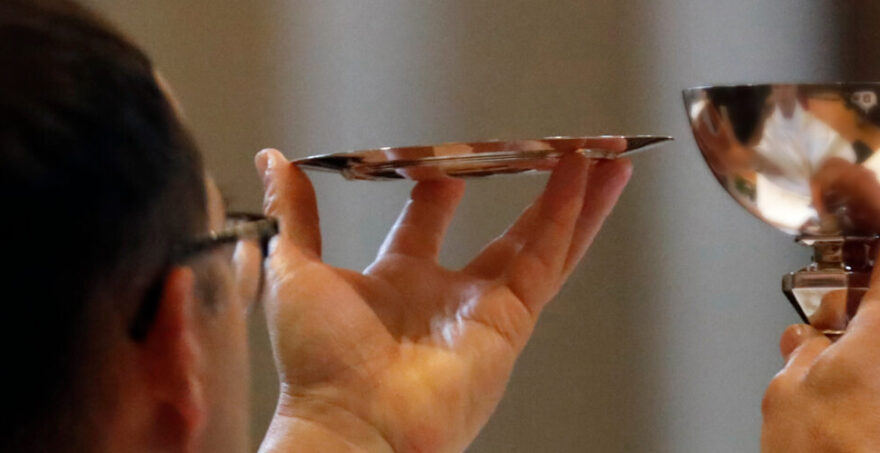Sharing Heaven with Strangers
by Soren & Ever Johnson

“Um…that was awkward!”
That’s what we sometimes hear from our teens after they see us chatting with strangers at Trinity House Café, the grocery check-out aisle, the church vestibule, or elsewhere.
Smartphone-in-hand for an average of 96 checks per day as we navigate a fractured public square, the number of Americans interacting with strangers is plummeting. Most of us are choosing to pull inward rather than extend ourselves.
But by withdrawing into ourselves, we become, to recall the words of Robert Frost, a “diminished thing.” Research suggests we “consistently underestimate how much a new person likes us following an initial conversation,” and so we can fail to make good use of the power of human interaction. Most importantly, we lose out on what we call in our Heaven in Your Home Workshop the “crown of communion,” and arguably, the heart of the Gospel.
Here’s why.
First, a personal question: Are you familiar with that deep sense of peace you carry in your heart especially after going to confession, receiving the Eucharist, or after a restful Sunday? In each of these moments—whether it’s encountering Christ’s mercy, partaking of his body, or participating in the rest of the 3rd commandment—we “carry” or preserve the communion of God’s life within us in a powerful way.
On the flip side, we are all familiar with the experience of harming or even breaking this communion. Maybe several days—OK, maybe even hours! —after going to confession, you fall into a familiar temptation. Or maybe it’s an argument on the way home from Sunday Mass. Whatever it is, we know the pain of those moments when we allow sin and woundedness to interrupt our communion with God.
As we build our Trinity House or “domestic church,” we are called to carry communion from the Eucharist, the font of our faith life, directly to the persons and relationships of our marriage and family. As we achieve some lasting communion with God and our closest loved ones, we can put it to work in caring for each other in our household, and from there, into the sheer enjoyment of that communion in family culture. At each level, we take the opportunity to welcome, listen, and serve, bringing our family closer to union with the Trinity and finding heaven, the continuation of union with God, in our home.
But wait, the story is not over!
Aren’t we called to share the life we’re living—of communion with God and family—with neighbors, friends, and even strangers in the broader community? To restore our world to friendship with God and eternal life with him in heaven? We can’t give what we don’t have, but if we’re deepening our walk with the Lord, strengthening our marriage and forming our family members, leading our family in shared work, and enjoying a vibrant family culture, then we’ve definitely got something to give!
When we reflect on Andrei Rublev’s famous Trinity icon, we recall that it was originally called “The Hospitality of Abraham and Sarah.” When the three strangers arrived (Gen. 18:1-15), Abraham and Sarah stopped everything and hosted them. In the 4th century Rule of St. Benedict, which even to this day continues to guide many monastic communities, Rule 53 begins, “All guests who present themselves are to be welcomed as Christ…” In providing hospitality and service to others, we find the “crown of communion,” the culmination of our communion with God, the ability to share the possibility of eternal life, of happiness in heaven, not just with our loved ones, but with neighbors and even strangers.
Can it be “awkward”? Sure. Can others reject our hospitality—whether we’re asking the elderly woman next to us in the check-out line how she’s doing, or inviting friends or neighbors to dinner or to join us for a drink? Of course. Should we strive to extend these types of invitations?
Yes.
To embark on this way of life is to resolve to be not a “diminished thing;” not curvatus in se (“turned in on oneself”), as St. Augustine described our sinful nature, but to be the man or woman God made us to be—reflecting his image of interpersonal communion and self-gift.
And if that’s not enough to motivate us, maybe we can take to heart the mandate of Hebrews 13:2 in the days ahead and find creative ways to apply it to our own unique circumstances: “Do not neglect to show hospitality to strangers, for thereby some have entertained angels unawares.”





